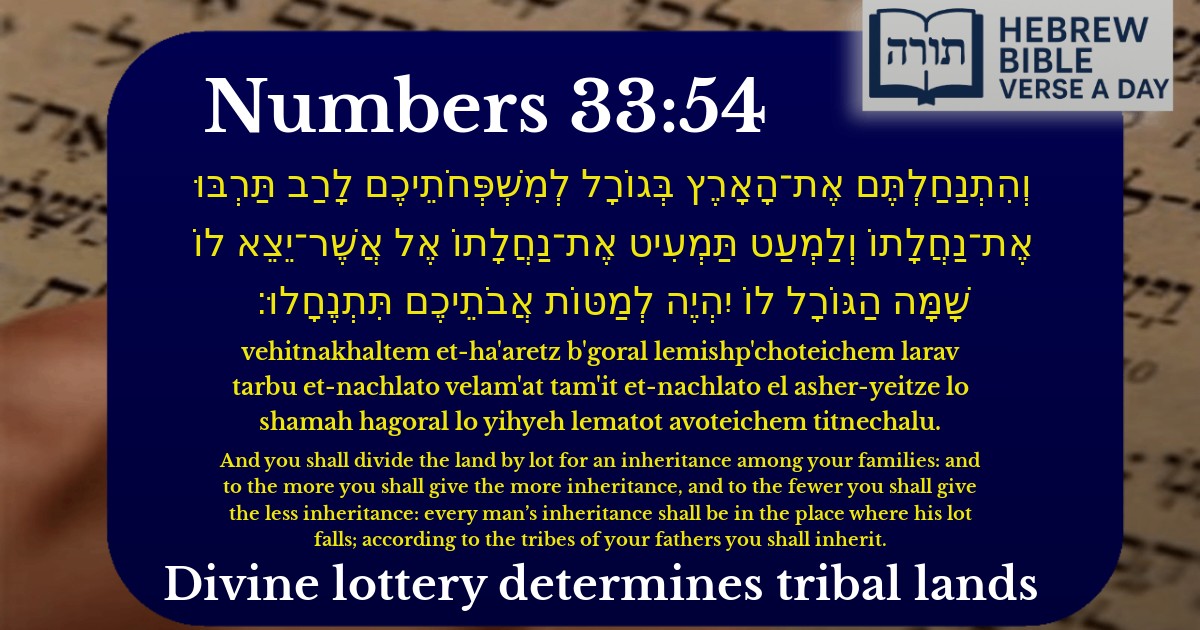Join Our Newsletter To Be Informed When New Videos Are Posted
Join the thousands of fellow Studends who rely on our videos to learn how to read the bible in Hebrew for free!
Hebrew Text
וְהִתְנַחַלְתֶּם אֶת־הָאָרֶץ בְּגוֹרָל לְמִשְׁפְּחֹתֵיכֶם לָרַב תַּרְבּוּ אֶת־נַחֲלָתוֹ וְלַמְעַט תַּמְעִיט אֶת־נַחֲלָתוֹ אֶל אֲשֶׁר־יֵצֵא לוֹ שָׁמָּה הַגּוֹרָל לוֹ יִהְיֶה לְמַטּוֹת אֲבֹתֵיכֶם תִּתְנֶחָלוּ׃
English Translation
And you shall divide the land by lot for an inheritance among your families: and to the more you shall give the more inheritance, and to the fewer you shall give the less inheritance: every man’s inheritance shall be in the place where his lot falls; according to the tribes of your fathers you shall inherit.
Transliteration
Vehitnakhaltem et-ha'aretz b'goral lemishp'choteichem larav tarbu et-nachlato velam'at tam'it et-nachlato el asher-yeitze lo shamah hagoral lo yihyeh lematot avoteichem titnechalu.
Hebrew Leining Text
וְהִתְנַחַלְתֶּם֩ אֶת־הָאָ֨רֶץ בְּגוֹרָ֜ל לְמִשְׁפְּחֹֽתֵיכֶ֗ם לָרַ֞ב תַּרְבּ֤וּ אֶת־נַחֲלָתוֹ֙ וְלַמְעַט֙ תַּמְעִ֣יט אֶת־נַחֲלָת֔וֹ אֶל֩ אֲשֶׁר־יֵ֨צֵא ל֥וֹ שָׁ֛מָּה הַגּוֹרָ֖ל ל֣וֹ יִהְיֶ֑ה לְמַטּ֥וֹת אֲבֹתֵיכֶ֖ם תִּתְנֶחָֽלוּ׃
Parasha Commentary
📚 Talmud Citations
This verse is quoted in the Talmud.
📖 Bava Batra 122a
The verse is referenced in the discussion about the division of the Land of Israel among the tribes by lot, emphasizing the divine allocation of portions.


Allocation of the Land by Lot
The verse (Bamidbar 33:54) describes the method by which Eretz Yisrael was to be divided among the tribes and families of Bnei Yisrael. The process involved two components: the goral (lot) and the proportional distribution based on family size. Rashi explains that the land was divided by lot through divine inspiration—the Urim v'Tumim would declare which portion belonged to which tribe, ensuring a fair and divinely ordained allocation.
Proportional Inheritance Based on Family Size
The Torah emphasizes that larger families would receive larger portions ("larab tarbeh et nachalato"), while smaller families would receive smaller portions ("lam'at tam'it et nachalato"). Ramban (Nachmanides) elaborates that this was not merely a matter of fairness but also reflected the principle that each tribe's portion was to sustain its population adequately. The Sifrei adds that this proportional distribution ensured that no tribe would dominate another, maintaining balance among the tribes.
The Role of the Tribes and Ancestral Inheritance
The verse concludes by stating that the inheritance was to be according to the tribes of their fathers ("l'matot avoteichem titnachalu"). The Talmud (Bava Batra 122a) derives from this that tribal lineage was crucial—land could not be permanently transferred from one tribe to another, preserving the integrity of each tribe's portion. This was later reinforced by the laws of the Yovel (Jubilee year), which mandated the return of ancestral land to its original owners.
Divine Providence in the Division
The Midrash Tanchuma (Korach 12) highlights that the allocation by lot demonstrated that the division was not arbitrary but directed by Hashem. Just as the manna was distributed according to each family's needs, so too was the land apportioned with divine wisdom. This reinforced the idea that Eretz Yisrael was a sacred trust, granted by Hashem in accordance with His will.
Key Lessons from the Verse